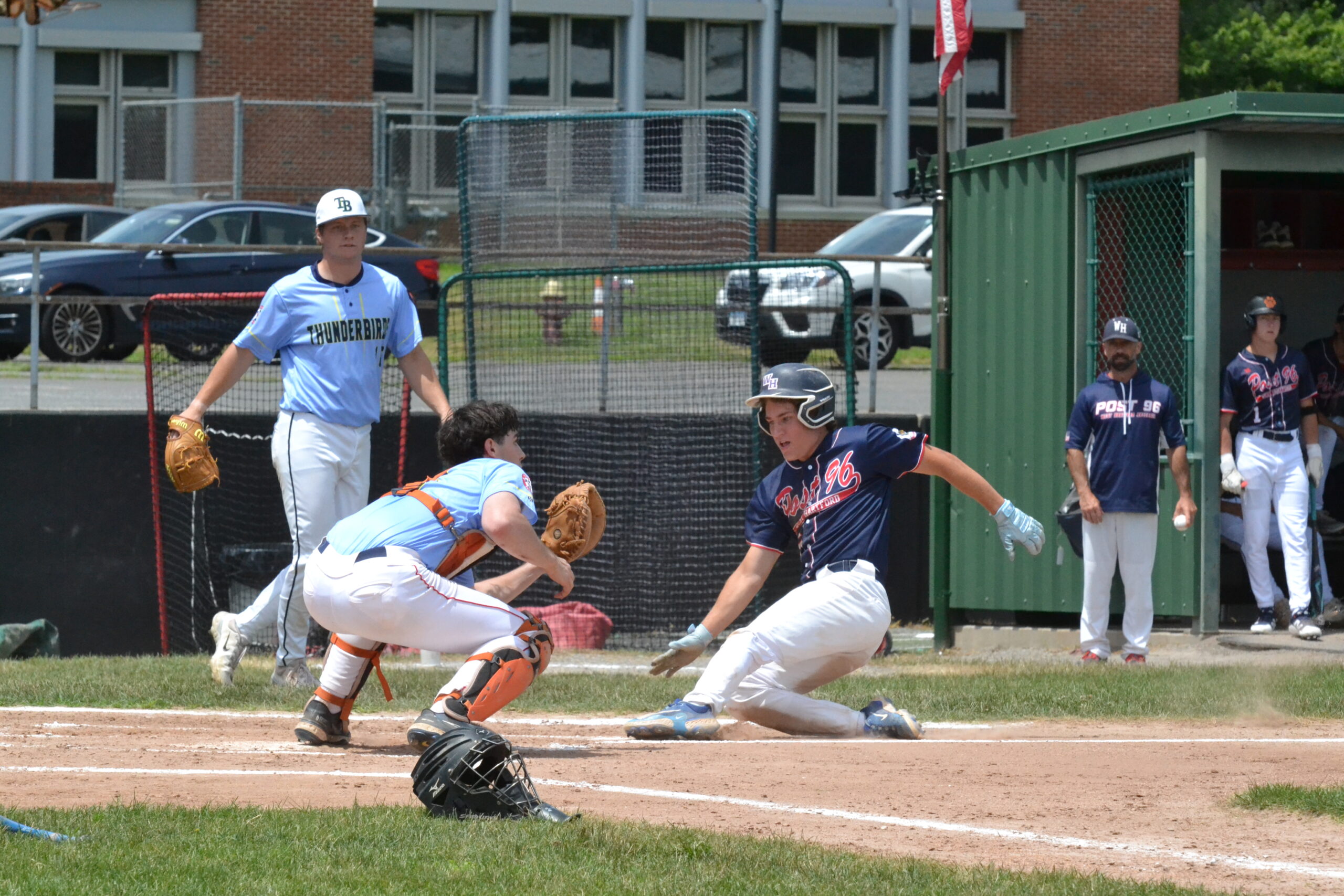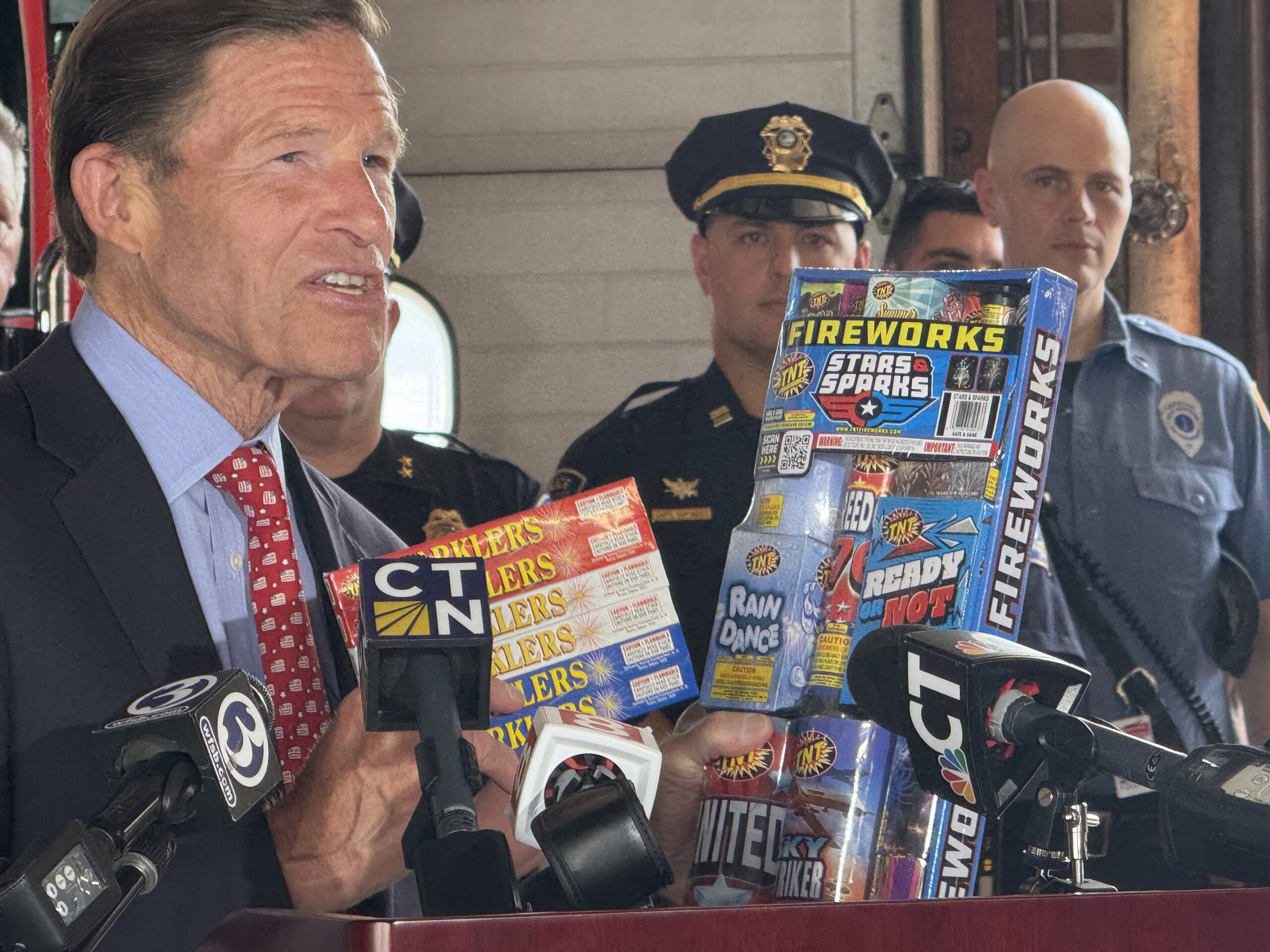West Hartford’s Food Scrap Recycling Pilot Highlighted as ‘Earth Week’ Begins

Audio By Carbonatix

Lt. Gov Susan Bysiewicz kicked off Earth Week in West Hartford on Monday. From left: DEEP Acting Deputy Commissioner Tracy Babbidge, Mayor Shari Cantor, Lt. Gov. Susan Bysiewicz, Town Council member Tiffani McGinnis. Photo credit: Ronni Newton
Lt. Gov. Susan Bysiewicz and other officials were in West Hartford on Monday morning, launching a celebration of Earth Week by highlighting the town’s efforts to divert food scraps from the waste stream.
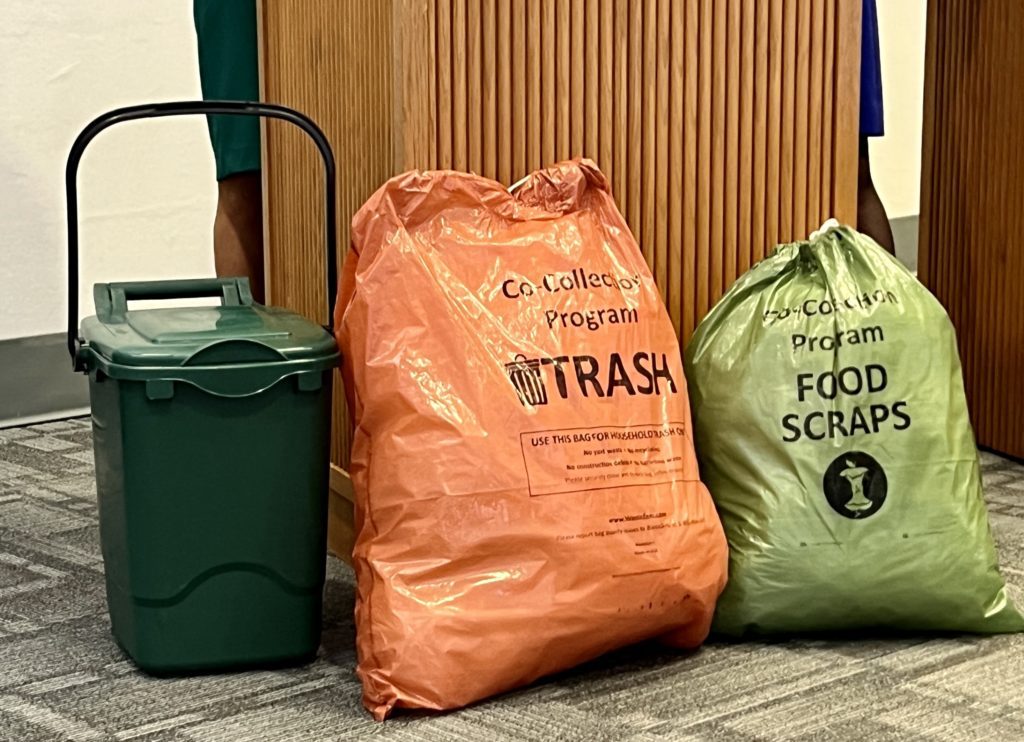
A green food waste container will be distributed to all participants in the food scrap collection pilot, along with 15-gallon orange trash bags and 8-gallon green food scrap collection bags. Photo credit: Ronni Newton
By Ronni Newton
West Hartford will begin a pilot program on May 1, involving 685 homes in the Morley neighborhood, where residents will be asked to separate their food scraps from their trash in order to develop data about the impact the diversion can have on reducing the total amount of household waste.
The theme of this year’s Earth Week is “Investing in Our Planet,” Lt. Gov. Susan Bysiewicz said during a Monday morning press conference at West Hartford Town Hall, highlighting as a great example the town’s plans to partner with Blue Earth Compost to increase waste diversion which will in turn increase sustainability and positively impact equity.
“It is a fact that we unfortunately throw out 40% of our food every year. That is a huge amount of wasted resources, wasted money, and it’s especially troubling when people are experiencing food insecurity and when grocery prices have gone up so much with inflation,” Bysiewicz said. Food waste has a negative impact on the environment, as well as the economy.
“According to Recycle Track Systems, food waste is the largest component taking up space in our landfills,” Bysiewicz said. She thanked West Hartford Mayor Shari Cantor and other town officials for being innovators, and noted that her hometown of Middletown has a pilot program as well, but only in the restaurant district.
In West Hartford, participants in the pilot will be all homes in the area bounded by Trout Brook Drive to the west, North Quaker Lane to the east, Fern Street to the south, and Asylum Avenue to the north. The area was chosen for multiple reasons, including that it’s fairly densely-populated, residents are engaged with each other, the grid layout makes the collection simpler, and because the roadways are well-traveled and the pilot will be visible to many others in the community.
Connecticut is at a crossroads, with determining what to do with waste reaching a crisis situation, particularly following the closure of the Materials Innovation and Recycling Authority (MIRA) facility in Hartford last year, Cantor said. More and more trash is sent out of state, with transportation adding to the environmental impact.
Public Works Director John Phillips has been talking about the problem for years, Cantor said, noting that people just expect their “waste to disappear, but it doesn’t, it becomes a part of our world, and how we dispose of it and how we treat is should be thought of more as a utility.”
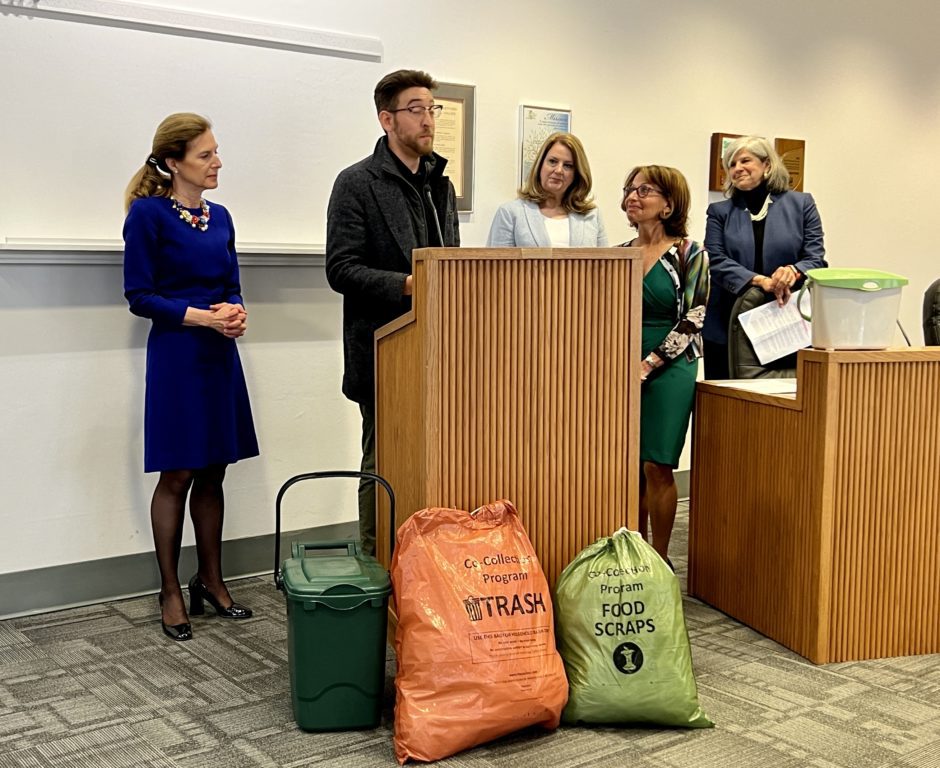
Sam King, co-founder and partner of Blue Earth Compost, speaks at an Earth Week press conference in West Hartford on Monday, higlighting the town’s food scrap pilot. Also pictured are (from left)Lt. Gov. Susan Bysiewicz, Town Council member Tiffani McGinnis, Mayor Shari Cantor, Acting DEEP Deputy Commissioner Tracy Babbidge. Photo credit: Ronni Newton
Cantor said that while West Hartford is one of the state’s leaders in efforts to deal with the crisis, “I feel like we’re behind. this is something that we should have been doing a long time ago.” The idea of implementing pay-as-you-throw in West Hartford was first floated in 2016, but now efforts are being backed by the state – which is funding pilot programs through a total of $5 million in grants – in an effort to show residents that this will work to reduce the amount of waste produced.
West Hartford is one of 15 municipalities and three regional groups in Connecticut to receive a funding for a pilot announced last fall by the state’s Department of Energy and Environmental Protection (DEEP) as part of the first round of awards from the Sustainable Materials Management (SMM) Grant program. The town was initially given $106,200, but another $7,800 has been added to the grant in order to cover the costs of enhanced reporting and the purchase of higher quality receptacles for the curbside food scrap collection.
Cantor, like Bysiewicz, said it’s both an environmental and an economic issue. “Supply and demand. We don’t have places to dispose of our waste.” The remaining incinerators in the state are near the end of their life expectancy, and we have got to figure out how to treat our waste, Cantor said.
Although there will be no cost to the residents involved in the pilot, it will also be a test of the “pay as you throw” concept to determine the number of bags households use each week for the remaining waste.
Residents in the pilot will receive 15-gallon orange bags for trash and smaller 8-gallon green bags for food scraps – and will be required to place only those bags in their bins. The orange bags will be placed in the residents’ existing dark green (or in some cases pink) wheeled trash barrel before being brought to the curb, and participants in the pilot will also be given a smaller (6-gallon) container with a handle that will hold the green food scrap bag(s) and that they will also bring to the curb on the day of their trash pick-up.
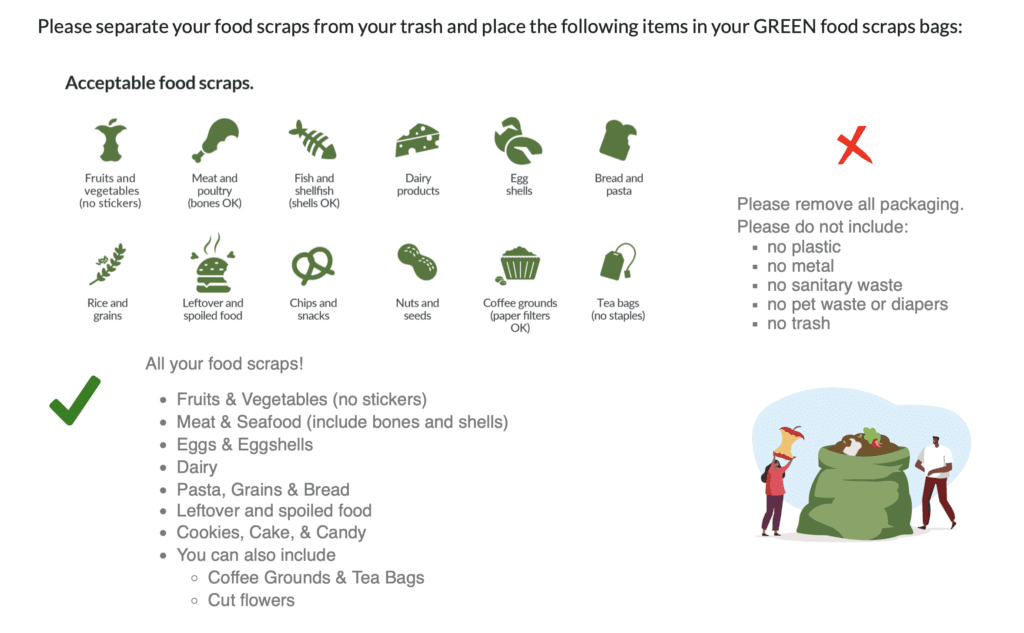
A website provides information about items eligible for the food scrap collection. Screenshot
It’s estimated that the average household will discard no more than seven to eight pounds of food waste per week, so the container should not be too heavy for most people to carry – although a committee working on the pilot is already discussing ideas to help those who may require assistance.
During the pilot participants will be able to receive extra bags if they need them. But if the program were to be implemented, then the bags would need to be purchased – and the more bags you fill, the more you pay – which will convert the approach to waste to more of a utility basis. Cantor said her 95-year-old mother, who probably would fill a green bag only once a month, would end up paying much less than a large family – although that family can also learn to divert more of their trash.
The town is also in the early stages of creating a transfer station at Public Works’ Brixton Street campus which will help better manage the trash process.
Cantor said this is important for many reasons and is a holistic approach. “I as a mayor don’t want to keep increasing our budget because tipping fees are going up. There are so many other ways that our taxpayers can benefit from taxpayer dollars.”
DEEP Acting Deputy Commissioner Tracy Babbidge also attended the press conference, and noted that the state is facing significant challenges and West Hartford is playing an important role.
After the MIRA plant closed last summer, “basically we have reached an inflection point. We are exporting a million tons of waste outside the state’s borders,” she said, which is not a sustainable materials management policy, and is also a step backward toward a commitment to environmental justice because many of the places to which the trash is shipped are communities of color or lower income communities.
Gov. Ned Lamont is supporting House Bill 6664, which articulates this vision. “It really puts us on the right track to how we regain self-sufficiency,” Babbidge said, and one of the components addresses accelerating organics diversion. Food scraps account for up to a half million tons of what is currently be thrown away as trash, and that’s an available opportunity and resource.
“It’s really the work that you will be doing at the local level that informs us in terms of the bigger picture and how we scale these pilots up,” Babbidge said.
What West Hartford is doing, she said, “is such an important step forward to inform us in terms of where we’re going statewide … and is also informing sister states … and it’s our step forward into the circular economy,” farm-to-table-back-to-farm.
In West Haven, the pilot that has been underway since November has already resulted in the diversion of 130 tons of food scraps, and with tip fees escalating from roughly $60 per ton to perhaps $120 per ton, that can have a major financial impact.
Babbidge said DEEP will be looking at the metrics and lessons learned from all of the pilots.
Sam King, one of the founder and a partner with Blue Earth Compost, said his company was founded in West Hartford almost 10 years ago out of the back of a Volkswagen, and is literally a garage-grown story to find a solution to a problem.
Blue Earth was awarded the contract with the Town of West Hartford to collect food scraps during the pilot through a competitive bid process. They already have many customers in West Hartford through a subscription service for food scrap pick-up every other week.
The partnership with West Hartford for the pilot, King said, will hopefully be “the foundation for the kind of cultural change” that is critical. “We’re so very happy to be a partner with the Town of West Hartford in this regard,” he said.
“Every day really should be an Earth Day,” King said, to appreciate why doing the right thing for the environment is so important. “When we’re taking these food scraps out of the waste stream, we’re doing not just the tip fees … what we’re also doing is cutting down climate change, greenhouse emissions. We are turning a would-be waste into a renewal, into compost, into soils that could be used to reinvest and grow more plants. We’re cutting down on environmental justice issues where people who live nearby these polluting plants won’t have to see as much trash sent their way. And that’s just the tip of the iceberg.”
This is one of the easiest and most tangible ways to make an impact on the planet, King said, and said he’s excited for the people who are going to be part of the pilot. “We’re behind you, we’re behind the town, and we’re just very happy to be stepping up here.”
King said his business was built to play a part in solving a problem, and to help preserve the world’s beauty for future generations. “The fact that we are seeing these practices brought into the status quo is both very exciting and lends credence to the work we have been doing for years.”
Town Council member Tiffani McGinnis also attended Monday’s press conference. She lives in the pilot area, and is personally looking forward to participating. She said that now that she and her husband are newly empty nesters – with their 6-foot-3 teenager off at college – they haven’t figured out how to cook for just two and have a lot of food scraps.
“Anything our town can do to help climate change … is so important,” McGinnis said.
In addition to Blue Earth Compost, West Hartford is also partnering with WasteZero, which is assisting with education and marketing/outreach for the pilot, and that process has already begun. The pilot itself will begin on May 1, 2023, and run through Jan. 31, 2024.

Sample countertop food scrap collection bin. Photo credit: Ronni Newton
Phillips said participation by those who are part of the pilot will be a key factor in determining its success. Letters have been sent out and those who live in the pilot area have been invited to information sessions. He’s hoping that West Hartford will be able to top the results of the West Haven pilot.
There is also a website, reducethetrashct.com/westhartford, where information can be found about what materials are eligible for food scrap collection. There are other tips and FAQs on the site.
Most people will want to collect food scraps in a smaller container that they keep on their kitchen counter, and an example of one type was shared during Monday’s press conference, although there are many other containers that could be used.
Feedback from participants in the pilot will be important as well, and can be shared at [email protected].
“We really want other from people who are reluctant,” said Katherine Bruns, West Hartford’s recycling coordinator – from people who say it’s too messy or have other reasons why they don’t want to participate.
Like what you see here? Click here to subscribe to We-Ha’s newsletter so you’ll always be in the know about what’s happening in West Hartford! Click the blue button below to become a supporter of We-Ha.com and our efforts to continue producing quality journalism.


